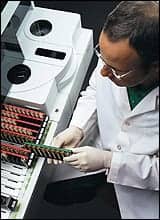NEW YORK (Reuters Health) – A serum marker component called "SLAK" is an independent prognostic factor in patients with lung adenocarcinoma, a Japanese team of researchers report.
"KL-6/MUC1 was discovered by Kohno of Hiroshima University, a co-author of this paper, and it is now widely used in Japan as a serum marker for interstitial pneumonia," Dr. Noboru Hattori from Hiroshima University in Japan told Reuters Health.
KL-6/MUC1 is composed of a transmembrane mucin (MUC1) often observed in adenocarcinomas, plus a glycoprotein (KL-6) classified as a lung tumor antigen.
"SLAK, a submolecule of KL-6/MUC1, is now shown in the current study to serve as a prognostic factor in lung adenocarcinoma patients," Dr. Hattori continued.
The investigators assessed the association between SLAK levels and the clinical characteristics and survival of 103 patients newly diagnosed with lung adenocarcinoma, according to the report in the June 15th issue of the International Journal of Cancer.
Circulating SLAK was detected in serum samples from 57% of patients with lung adenocarcinoma and 11% of healthy controls, the authors report, but serum SLAK levels were significantly higher in the patients with lung adenocarcinoma (p < 0.0001).
SLAK levels were highest in lung adenocarcinoma patients with distant metastasis, the results indicate.
High serum SLAK levels correlated significantly with T factor, distant metastasis, and serum CA19-9 level, but not with age, sex, patient performance status, and N factor (cancer stage).
Survival of patients with SLAK levels of 50 U/mL or higher was significantly worse than that of patients with SLAK levels below 50 U/mL, the report indicates.
Median survival in the low-SLAK group was 26.3 months, the investigators report, versus 8.0 months in the high-SLAK group.
"If patients with lung adenocarcinoma of stage IA-IIIA show higher serum level of SLAK, these patients may already have occult metastases," Dr. Hattori said. "Thus, we may have to treat these patients extensively both with neoadjuvant and adjuvant chemotherapy. However, these points are not clarified yet."
"Further investigation is needed to clarify whether serum levels of SLAK in operable lung adenocarcinoma patients influence the necessity of neoadjuvant or adjuvant chemotherapy," Dr. Hattori said. "Clinical significance of serum SLAK levels in adenocarcinoma of other organs, such as breast, colon, and pancreas, should be investigated."


